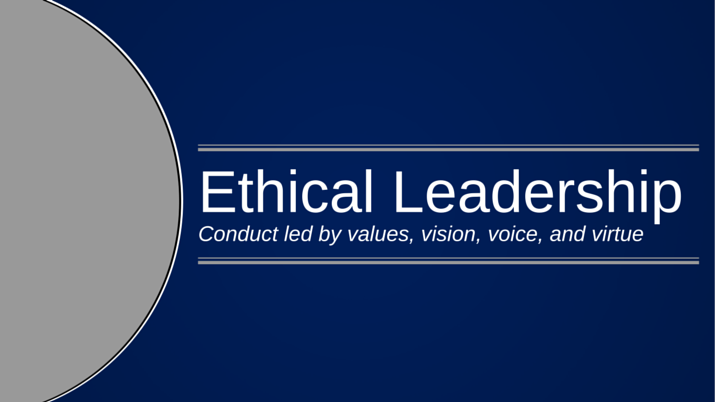What is Ethical Leadership?

Last Updated September 18, 2023
Ethical leadership is a form of leadership in which individuals demonstrate conduct for the common good that is acceptable and appropriate in every area of their life. It is composed of the following three major ethical traits.
3 Major Ethical Traits
Be the Example
A noble quality of a leader is leading by example. As an ethical leader, it’s important to remember that actions often speak louder than words. People are more likely to judge someone based on how they act, rather than what they say. By practicing and demonstrating the use of ethical, honest and unselfish behavior to subordinates, ethical leaders may begin to earn the respect of their peers. People may be more likely to follow a leader who respects others and shows integrity.
Champion the Importance of Ethics
One role of an ethical leader is focusing on the overall importance of ethics, including ethical standards and other ethical issues, and how these factors can influence society. As an ethical leader, it’s important to teach peers about ethics, especially in cases where they are faced with an ethical issue in the workplace.
Communicate
Successful ethical leaders tend to be good communicators. People communicate in different ways. Some may feel comfortable speaking in public, regardless of personnel or situation, while others may be hesitant to speak with a leader because of fear, anxiousness or simply not knowing how to articulate what they are trying to say. They might be better talking via email, rather than in person. It’s an ethical leader’s job to communicate with each member of the team, but also allow for open conversation, as some people may have questions and concerns that need addressed. It’s important for leaders to build camaraderie with their team. Quality relationships tend to be built on trust, fairness, integrity, openness, compassion and respect.
Impacts of Ethical Leadership
Ethical leaders can help establish a positive environment with productive relationships over three levels: the individual, the team and the overall organization. Nurturing the relationships at each of these levels can lead to positive outcomes and benefits for ethical leaders.
The Well-Being of the Individual
Maintaining a positive working atmosphere is an important responsibility of a strong ethical leader. Ethical leaders who lead by example may influence others to do the same. Generally, people are affected by the interactions that occur around them. Positive communication among co-workers may help influence job productivity and attitude.
The Energy of the Team
Ethical leadership can also involve the management of conduct and collaboration within a team. Typically, morale is higher in the workplace when people are getting along with each other. When co-workers are working as a team, it can help build relationships in the workplace and help the overall performance of the group. Generally, strong leaders lead by example.
The Health of the Organization
The importance of maintaining a positive attitude in the workplace has a lot to do with improving the overall health of the organization. When people can show respect for one another and can value other’s opinions, it may help create a productive working environment. An ethical organization can occur when communities of people work together in an environment of mutual respect, where they can grow personally, build friendships and contribute to the overall goal.
The 4-V Model of Ethical Leadership
The 4-V model helps align the internal beliefs and values with the external behaviors and actions for the purpose of the common good. The four V’s stand for Values, Vision, Voice and Virtue, the characteristics that help create a strong ethical leader. In the end, the main goal of an ethical leader is to create a world in which the future is positive, inclusive and allows the potential for all individuals to pursue and fulfill their needs and meet their highest potential.





